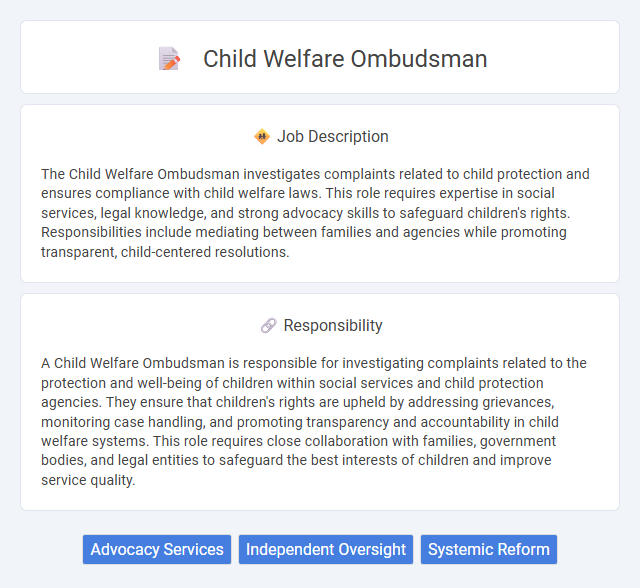
The Child Welfare Ombudsman investigates complaints related to child protection and ensures compliance with child welfare laws. This role requires expertise in social services, legal knowledge, and strong advocacy skills to safeguard children's rights. Responsibilities include mediating between families and agencies while promoting transparent, child-centered resolutions.
People who are empathetic, patient, and have strong communication skills are likely to be suitable for the Child Welfare Ombudsman role. Those who can handle emotionally challenging situations and maintain impartiality may find this job aligns with their abilities. Individuals lacking resilience or sensitivity to children's issues might struggle in this position.
Qualification
A Child Welfare Ombudsman typically requires a bachelor's degree in social work, psychology, law, or a related field, with many positions preferring a master's degree in social work or public administration. Extensive experience in child welfare, family services, or legal advocacy is essential, alongside strong communication and conflict resolution skills. Certification or licensure in social work may be required depending on jurisdiction, emphasizing ethical standards and comprehensive knowledge of child protection laws.
Responsibility
A Child Welfare Ombudsman is responsible for investigating complaints related to the protection and well-being of children within social services and child protection agencies. They ensure that children's rights are upheld by addressing grievances, monitoring case handling, and promoting transparency and accountability in child welfare systems. This role requires close collaboration with families, government bodies, and legal entities to safeguard the best interests of children and improve service quality.
Benefit
The Child Welfare Ombudsman role likely enhances transparency and accountability within child protection services, improving the probability of fair investigations and resolutions. Families and children may benefit from an impartial advocate who addresses complaints and systemic issues more effectively. This position could increase trust in child welfare systems, leading to better overall outcomes for vulnerable children.
Challenge
The Child Welfare Ombudsman job probably involves navigating complex legal and social systems to advocate effectively for vulnerable children. Balancing the interests of families, government agencies, and the children's best welfare likely presents significant emotional and ethical challenges. Managing these conflicting demands requires strong communication skills and resilience in the face of potentially distressing situations.
Career Advancement
A Child Welfare Ombudsman plays a critical role in advocating for children's rights and ensuring the accountability of child protection services. Career advancement opportunities often include senior ombudsman roles, policy advisory positions, and leadership roles within governmental or nonprofit organizations focused on child welfare. Gaining specialized certifications and experience in mediation, law, or social work can significantly enhance prospects for promotion and influence in the field.
Key Terms
Advocacy Services
Child welfare ombudsmen provide critical advocacy services by investigating complaints related to child protection and ensuring the enforcement of child welfare laws. They act as impartial intermediaries between families, social services, and government agencies to resolve issues impacting children's safety and well-being. Their role includes promoting systemic reforms and raising public awareness to enhance the effectiveness of child welfare programs.
Independent Oversight
The Child Welfare Ombudsman provides independent oversight by investigating complaints related to child protection services, ensuring accountability and transparency in child welfare agencies. This role involves monitoring compliance with policies and regulations to safeguard children's rights and well-being. By offering impartial reviews and recommendations, the ombudsman fosters trust and effectiveness in the child welfare system.
Systemic Reform
The Child Welfare Ombudsman plays a critical role in systemic reform by identifying patterns of abuse, neglect, and policy failures within child protection agencies. They analyze case data to recommend changes that improve accountability, transparency, and service delivery in child welfare systems. Their advocacy helps implement evidence-based policies aimed at enhancing the overall safety and well-being of vulnerable children.
 kuljobs.com
kuljobs.com